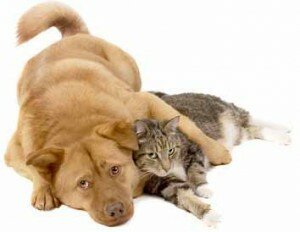We humans don’t get childhood shots
repeatedly throughout our lives.
Why do our pets?
Top vet schools and these major veterinary organizations have changed their recommended vaccination guidelines to reduce the “vaccine load” on dogs and cats: The American Veterinary Medical Association, the World Small Animal Veterinary Association, the American Animal Hospital Association, the American Association of Feline Practitioners and The American Holistic Veterinary Medical Association.
Unfortunately, changes have been slow to come to the veterinary clinic level.
Why does this matter? Unnecessary vaccination increases the risk of adverse vaccine reactions but does not increase immunity to disease.

Are unnecessary vaccines dangerous?
Watch our new 3-minute video on
adverse vaccine reactions in dogs and cats
Important: This website does NOT oppose all vaccination nor does it promote vaccination. We do not presume to tell you what decision you should make. We are advocates for informed consent before you make your vaccination decisions. Freedom of choice depends on unbiased information.
This website DOES OPPOSE:
- vaccination without prior explanation of risks, benefits, vaccine effectiveness and duration of immunity
- revaccination of animals that already have long or lifetime immunity
- “one size fits all” vaccination protocols
- multiple vaccines given in one visit, especially to cats and small breed dogs
- optional vaccines routinely given to pets not specifically at risk
- optional vaccines offering short immunity, limited effectiveness and high adverse reaction rates
- vaccination of unhealthy animals
- vaccination before or during surgery
- vaccination of animals too young to form immunity
- vaccination with vaccines on the “not recommended” list of the AVMA, AAHA and/or WSAVA
- vaccine labels suggesting revaccination intervals sooner than supported by current research
Learn the facts:
Search by subject or category or cloud tag (at right)
Read 7 Quick Things Most People Don’t Know About Vaccinating Pets
Read Ask These Questions BEFORE Vaccinating Your Pet
Attention Veterinarians, vet techs, Certified Animal Welfare Administrators and others interested in serious education on titer testing see Dr. Ron Schultz’s Saving Lives with Antibody Titer Tests speaking in a video approved for RACE continuing education credits.
Don’t miss our new 3-minute video on vaccine reactions and read our fact-filled article.
Watch Karen Becker, DVM in the first of 4 interviews with one of the world’s top researchers in pet vaccination, Ronald D. Schultz, PhD. Here his impressive credential at the video’s beginning. (Click to watch Parts 2-4 of this video series plus additional videos.)
DISCLAIMER: All information, data, videos, study abstracts and material provided here is for general information purposes only, and is not to be intended as medical or legal advice. This information should not be used to replace a one-on-one relationship with a qualified pet health care professional. It is intended as a sharing of knowledge and information from available research. The decision whether or not to vaccinate is an important and complex issue which should be made by you in consultation with your pet health care provider. Our goal is to prevent vaccine illness and deaths through education. We neither promote the use of any vaccine or vaccine protocol nor advise against it. Authors of posted articles may not agree with all the information in other posted articles.
Copyright © 2012 Truth4Pets All Rights Reserved. Truth4Pets is a trademarked name.
Truth4Pets logo design by mattmilanoart.com Additional banner and website design by Geek Street Studios




